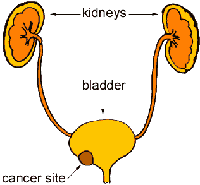In recent decades there has been a steady increase in the incidence of bladder cancer. However, doctors are making progress in treatment and survival rates are improving.
 The ways in which bladder cancers develop and progress are only partly understood. However, a number of substances that cause the cancers to develop have been identified. Chief among them are cancer-causing agents in cigarette smoke and various industrial chemicals. Cigarette smoking alone has been estimated to cause 50 percent of all bladder cancer cases . Long-term workplace exposure to chemical compounds such as paints and solvents has been estimated to cause another 20 to 25 percent of bladder cancer cases.
The ways in which bladder cancers develop and progress are only partly understood. However, a number of substances that cause the cancers to develop have been identified. Chief among them are cancer-causing agents in cigarette smoke and various industrial chemicals. Cigarette smoking alone has been estimated to cause 50 percent of all bladder cancer cases . Long-term workplace exposure to chemical compounds such as paints and solvents has been estimated to cause another 20 to 25 percent of bladder cancer cases.
More than 90 percent of all bladder cancers originate in the urothelium The majority of diagnosed bladder tumors are confined to the urothelium or the lamina propria and have not invaded the bladder muscle.
Painless blood in the urine ( hematuria ) is the most common symptom. It eventually occurs in nearly all cases of bladder cancer. In the majority of cases, the blood is visible during urination. In some cases, it is invisible except under a microscope, and is usually discovered when analyzing a urine sample as part of a routine examination.
Hematuria does not by itself confirm the presence of bladder cancer. Blood in the urine has many possible causes. For example, it may result from a urinary tract infection or kidney stones rather than from cancer. It is important to note that hematuria, particularly microscopic, might be entirely normal for some individuals. A diagnostic investigation is necessary to determine whether bladder cancer is present.
Treatment of the bladder cancer depends on a number of factors. These are
- How quickly the cancer is growing?
- The number, size, and location of the tumors,
- Whether the cancer has spread to other organs
- The patient's age and general health.
Before treatment begins, it is important to know exactly where the cancer is located and whether it has spread from its original location. Staging procedures include a complete physical exam and additional blood tests and scans such as CT scan, Ultrasound or MRI . Early (superficial) bladder cancer in which, the tumors are found superficially in the bladder wall, generally can be treated using the cystoscope in a procedure called transurethral resection of the bladder tumor (TUR-BT). The entire tumor can be removed cystoscopically
When several tumors are present in the bladder or when there is a risk that the cancer will recur, TURBT may be followed by treatment with drugs. The doctor may put a solution containing the Bacillus Calmette-Guerin (BCG), a form of biological therapy, directly into the bladder. Chemotherapy (anticancer drugs) may also be inserted directly into the bladder. Radiation therapy (also called radiotherapy) may be needed when the cancer cannot be removed with TUR because it involves a larger area of the bladder.
RADICAL CYSTECTOMY
When the cancer involves much of the surface of the bladder or has grown into the bladder wall infiltrating into the bladder muscles, standard treatment is to remove the entire bladder. This surgery is called a Radical Cystectomy. In this operation, the surgeon removes the bladder as well as nearby organs. In women, this operation includes removing the uterus, fallopian tubes, ovaries, and part of the vagina. In men, the prostate and seminal vesicles are removed.
When cancer involves the pelvis or has spread to other parts of the body, chemotherapy may be required.
Nowadays this surgery is done Laparoscopic / Robotic method.
Testimonials

The meeting with Dr Anil Bradoo was really good. He gave a very patient hearing. He tried to find out the root cause and explained the medical background for such a problem. I feel this is the kind of approach all doctors must-have. Lucky to meet the best urologist in Chembur. Thanks, Swati for recommending him and Thank you, doctor!
- Mr. Purohit

“Very impressed with Dr. Anil Bradoo. He performed surgery on me for bladder cancer back in ’07 and I am still here being able to talk about it. Great Uro-surgeon and best Urologist. What else can you say about someone who saved your life?”
